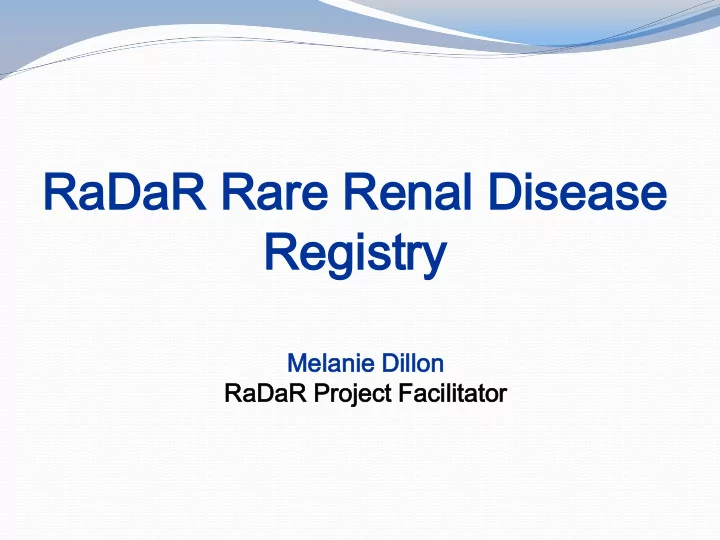

Ra RaDa DaR R Ra Rare re Re Rena nal l Di Dise sease ase Re Regi gistry stry Me Melanie nie Dillon RaDaR Project ject Facilitator tator
Ba Backgrou ckground nd The Nat Nationa ional Regi Regist stry ry of of Ra Rare re Kidn Kidney ey Di Disea seases ses (RaD RaDaR) R) is a Renal Association initiative designed to pull together information from patients who have certain rare kidney diseases. This will give a much better understanding of how these illnesses affect people. It will also speed up research. RaDaR is managed by a series of Rare Disease Groups consisting of experts in each condition.
History Hi story RaDaR began in 2009, recruiting paediatric patients with Steroid Resistant Nephrotic Syndrome (SRNS) and Membranoproliferative Glomerulonephritis (MPGN) In 2012 it expanded to other conditions in paediatric centres and then to adult centres in Autumn 2013. RaDaR now has UK-wide ethics approval for both adult and paediatric recruits for 25 conditions.
Cu Curre rrent nt Re Recruit cruitment ment Hepatocyte Nuclear Factor-1 Beta C3 Glomerulopathy Mutations (HNF1B) Adenine Phosphoribosyltransferase Deficiency (APRT-D) Hyperuricaemic Nephropathy Alport Syndrome Liddle Syndromes Atypical Haemolytic Uraemic Syndrome Lowe Syndrome (aHUS) Membranous Nephropathy Autosomal Recessive Polycystic Kidney Membranoproliferative Glomerulonephritis Disease (ARPKD) (MPGN) Bartters Syndrome Medullary Cystic Kidney Disease Dense Deposit Disease Pregnancy and Chronic Kidney Disease Dent Disease Primary Hyperoxaluria Cystinosis Shiga Toxin Associated Haemolytic Cystinuria Uraemic Syndrome (HUS) Epilepsy, Ataxia, Sensorineural deafness, Steroid Resistant Nephrotic Syndrome Tubulopathy Syndrome (EAST) (SRNS) Gitelman Syndrome Thin Basement Membrane Nephropathy Vasculitis
Coming Soon The following conditions will also soon be open for recruitment: IgA Nephropathy Pure Red Cell Aplasia Steroid Sensitive Nephrotic Syndrome
Cu Current rrent St Status atus of of Ra RaDaR DaR As of February 2015 there are: 1,884 UK patients in RaDaR Representing 24 conditions (all but APRT-D) From 39 Renal Units A further 24 units are in set-up
Oxalosis Recruitment There are currently: 38 UK Oxalosis patients in RaDaR 15 adults 23 children From 11 Renal units
Li Link nk wi with th Pa Patie tient nt Vi View ew RaDaR draws information from Patient View, an online patient’s system which records renal results, medications and clinic letters. Recruited patients are given access to PatientView to see their data online. The majority of renal units in the UK use Patient View. Those that don’t can still take part in RaDaR but have to enter the patient’s data manually.
Da Data ta Ca Captu pture re - 1
Da Data ta Ca Capture pture - 2 Generic pages of RaDaR provide minimal essential data, the majority of which can be transferred automatically from PV. Condition specific pages are currently only available for SRNS and MPGN patients, with the other conditions awaiting final verification. Current priority is to get patients consented and registered within RaDaR. Follow-up data entry will be organised at a later date.
In Information formation Se Security urity Data is encrypted and password protected. Participants provided with a secure log-in to access and check their own information via PatientView. Identifiable data only available to patient’s clinician and unit administrator. Members of the Rare Disease Groups will only see anonymised data – numbers rather than names.
Research Applications The two original RaDaR conditions – SRNS and MPGN – have separate sub-studies involving genetic testing of patients and longitudinal data collection. Applications are currently being considered for clinical trials using several of the RaDaR conditions including HUS and Primary Hyperoxaluria. As it develops RaDaR aims to link in with both industry studies and other European Registries – including Oxal Europe.
Co Contac ntact t De Detai tails ls Rare Disease se Manager ager (Governance, finance and set-up) Chrissie Jacobs 0117 323 8211 Christine.Jacobs@renalregistry.nhs.uk Projec ject t Facilitat tator or (Consent, data entry and general admin) Melanie Dillon 0121 333 9233 Melanie.Dillon@bch.nhs.uk
Recommend
More recommend